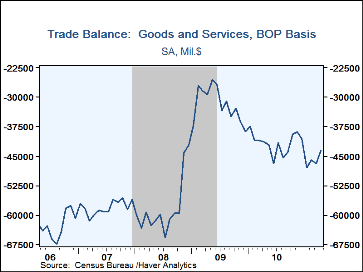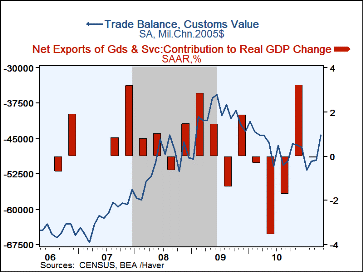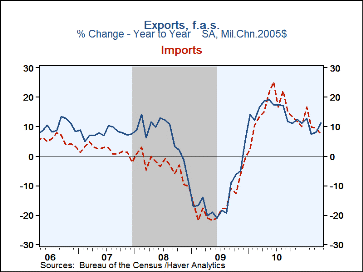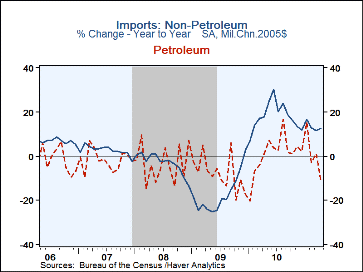 Global| Jun 09 2011
Global| Jun 09 2011U.S. Trade Deficit Unexpectedly Shrinks
by:Tom Moeller
|in:Economy in Brief
Summary
The foreign trade deficit narrowed in April to $43.7B from $46.8B in March, initially reported as $48.2B. Expectations had been for $48.8B according to Action Economics. The latest figure was the least since December as exports rose [...]
The foreign trade deficit narrowed in April to $43.7B from $46.8B in March, initially reported as $48.2B. Expectations had been for $48.8B according to Action Economics. The latest figure was the least since December as exports rose 1.3% m/m but imports slipped 0.4%. In chained 2005 dollars the overall deficit in goods fell to $44.2B, its least since February of last year, as real exports increased 11.2% y/y and imports rose 7.5%.
Petroleum imports fell 5.5% (+21.1% y/y) as petroleum import volumes fell a sharp 14.5% and by 14.5% y/y as well. The per barrel cost of crude oil increased to $103.18 from $93.76 in March. Twelve months earlier, prices averaged $77.13. The total value of crude petroleum imports rose 21.1% y/y but the quantity fell 10.9%.
Overall imports slipped 0.4% (+15.9% y/y). Goods imports fell 0.5% (17.8% y/y) but when adjusted for higher prices they fell 3.1% (7.5% y/y). Nominal imports of foods, feeds & beverages rose 4.2% (20.3% y/y) though when adjusted for higher prices imports rose 1.9% (0.7% y/y). Nonauto capital goods imports rose 1.4% (15.9% y/y) after the 3.5% March gain. Virtually all of the y/y gain reflected higher volumes. Nonauto consumer goods imports jumped 5.0% (16.2% y/y) and all of the annual increase was real. Auto imports fell 12.9% (+9.0% y/y). Again, these changes mostly reflect volumes, not prices.
Total exports rose 1.3% (18.8% y/y) after a 4.9% March jump. A 1.7% increase (21.3% y/y) in goods exports translated to a 0.8% rise (11.2% y/y) in real terms. It reflected a 4.9% (34.6% y/y) jump in industrial supplies, a 3.1% increase (14.1% y/y) in capital goods and a 1.8% increase (12.0% y/y, ) in nonauto consumer goods. Automobile exports fell 6.8% m/m (+15.2% y/y).
Services exports increased 0.4% (12.2% y/y) reflecting gains in travel (16.5% y/y) and passenger fares (25.9% y/y). Imports of services ticked up 0.1% (6.5 % y/y) reflecting lesser changes in travel and passenger fares, held back by the lower dollar.
By country, the goods trade deficit with China increased to $21.6B as exports rose 20.8% y/y and imports rose 14.1% y/y. (Imports are roughly four times the level of U.S. exports.) The trade deficit with Japan improved sharply to $3.6B as exports rose 16.7% y/y and imports fell 6.5% y/y. (Imports from Japan are roughly twice the level of U.S. exports.) The trade deficit with the European Union improved slightly to $7.5B as U.S. exports rose 23.8% y/y and imports grew 24.9% y/y. (Imports from Europe are roughly one-third larger than U.S. exports.)
The international trade data can be found in Haver's USECON database. Detailed figures are available in the USINT database. The expectations figure is in the AS1REPNA database.
The Fed's latest Beige Book covering regional economic conditions is available here.
| Foreign Trade | Apr | Mar | Feb | Y/Y | 2010 | 2009 | 2008 |
|---|---|---|---|---|---|---|---|
| U.S. Trade Deficit | $43.7B | $46.8B | $46.0B | $41.5B (4/10) |
$500.0B | $381.3B | $698.3B |
| Exports-Goods & Services (M/M) | 1.3% | 4.9% | -1.4% | 18.8% | 16.7% | -14.5% | 11.4% |
| Imports-Goods & Services | -0.4 | 4.2 | -2.0 | 15.9 | 19.5 | -23.0 | 8.1 |
| Petroleum | -5.5 | 15.6 | -5.8 | 21.1 | 32.5 | -44.0 | 37.0 |
| Nonpetroleum | 0.7 | 2.4 | -1.5 | 16.7 | 20.8 | -20.9 | 1.5 |
Tom Moeller
AuthorMore in Author Profile »Prior to joining Haver Analytics in 2000, Mr. Moeller worked as the Economist at Chancellor Capital Management from 1985 to 1999. There, he developed comprehensive economic forecasts and interpreted economic data for equity and fixed income portfolio managers. Also at Chancellor, Mr. Moeller worked as an equity analyst and was responsible for researching and rating companies in the economically sensitive automobile and housing industries for investment in Chancellor’s equity portfolio. Prior to joining Chancellor, Mr. Moeller was an Economist at Citibank from 1979 to 1984. He also analyzed pricing behavior in the metals industry for the Council on Wage and Price Stability in Washington, D.C. In 1999, Mr. Moeller received the award for most accurate forecast from the Forecasters' Club of New York. From 1990 to 1992 he was President of the New York Association for Business Economists. Mr. Moeller earned an M.B.A. in Finance from Fordham University, where he graduated in 1987. He holds a Bachelor of Arts in Economics from George Washington University.










